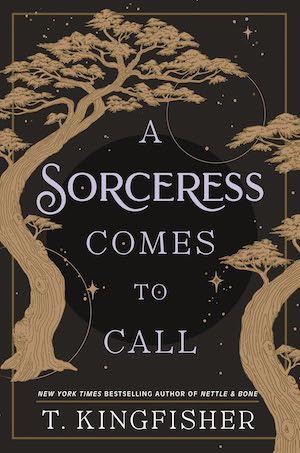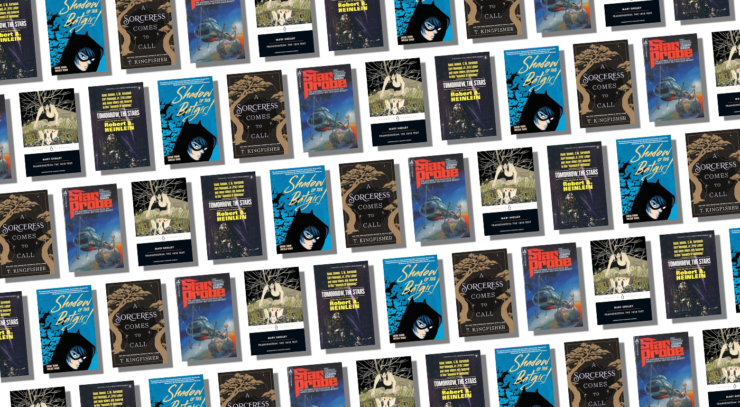Reactor previously published my thoughts and suggestions on how to manage parents in speculative fiction. Of course, there’s another sort of parent: the irredeemably bad parent. Indifferent, incompetent, even malicious. Such parents are bad for their kids, but great for authors (as evidenced by the fact that we’ve discussed atrocious parenting here before). Many exciting plots result from the child’s effort to escape the parent or to deal with the consequences of a toxic upbringing.
Herewith, five works about irredeemably bad parents.
Frankenstein; or, The Modern Prometheus by Mary Shelley (1818)

Victor Frankenstein is wealthy, driven, and brilliant. When Victor sets his mind to creating life (or at least reanimating dead tissue), nothing—social convention, the monumental R&D required, simple prudence—stops him until he finally succeeds in his quest. Victor’s Creature lives!
Victor is also shallow and easily repulsed. His Creature being ugly, Victor abandons it to survive or not as fate decrees. When the Creature re-enters Victor’s life, begging Victor to create a female Creature to share the Creature’s life, Victor agrees… only to dash the Creature’s hopes and inflame the Creature’s homicidal fury.
The poor Creature must not only deal with an alarming appearance and a dreadful father, but it has the misfortune of having read Goethe’s 1774 Die Leiden des jungen Werthers, a ludicrous paean to wretched emotional excess. This was arguably the worst book possible1 (of those available at the time2) to hand to a distraught, socially isolated autodidact. Nevertheless, if Victor had been a better father figure, or a father figure at all, the Creature might well have weathered reading Goethe at an impressionable age.
“Absalom” by Henry Kuttner and C.L. Moore (1946)

(Collected in Tomorrow, the Stars) Unlike Victor, Joel Locke is no negligent father. A former child genius, Joel is determined to provide his son Absalom with the careful mentoring that Joel’s intellectually inferior, tyrannical father could not supply. Joel controls every aspect of Absalom’s life, guiding Absalom towards fruitful educational avenues and away from subjects for which the ten-year-old is not yet ready.
Absalom has a different interpretation of the facts. Absalom is certain that, whether or not Joel is consciously aware of his true motivation, Joel is terrified that Joel will be as overshadowed by Absalom, as Joel’s father was by Joel. Joel is not trying to help Absalom be the best Absalom. Joel is trying to stunt his son. As brilliant as Joel is, Absalom is smarter. Joel is doomed to fail.
Star Probe by Joseph Green (1976)

In 2011, an alien star probe is detected en route past Earth. The World-Gov opts for prudence. Rather than risk retaliation by the product of an immeasurably superior civilization, World-Gov will not authorize any attempt to intercept or destroy the probe. Harold “Jesus” Hentson’s Rockets International decides to intercept the probe without the formality of official sanction.
RI can get a crewed ship to the alien probe. A safe return is impossible unless the astronaut can somehow refuel at the destination. Harold has the perfect candidate for the likely suicide mission. Harold’s dead father Jarl was a skilled astronaut whose mind was very conveniently recorded on tapes. Harold’s son, also Jarl, has a severe cognitive deficit but is otherwise healthy. All that needs to be done is to decant old Jarl into young Jarl, then send a dead man in the body of a young man nobody will miss on a one-way mission to glory.
However you are imagining the consent issues had to have been handled, the reality is worse. Old Jarl is too dead to provide informed consent, young Jarl is not capable of giving it, and really, Harold isn’t that interested in what either might say beforehand. He just wants a mission to that alien probe.
Shadow of the Batgirl by Sarah Kuhn and Nicole Goux (2020)

David Cain was an eminently terrible parent. Determined to turn his daughter Cassandra into a weapon, Cain denied Cassandra access to all but the most rudimentary speech and subjected her to rigorous martial arts training. Result: a girl who could barely speak but to whom body language was an open book. A girl who killed without mercy because she did not know mercy.
Cain’s plan worked flawlessly until it failed abjectly. A single word from a victim sent Cassandra fleeing from David Cain. Gotham is a daunting city in which to reinvent oneself, lacking as it does any sort of useful social services. But there are kindly individuals. It was to kindly librarian Barbara Jordan and diner owner Jackie that Cassandra turned.
In David Cain’s defense, at least he did not, as X-Bomb Betty’s father did, imbue her with the ability to explode in a 150-megaton explosion… once. Otherwise, Cain was such a comprehensively awful dad that he manages to make the Batman Family (turning damaged kids into violent vigilantes) look good.
A Sorceress Comes to Call by T. Kingfisher (2024)

Evangeline demands unquestioning obedience of her daughter Cordelia. Cordelia gives in—not so much because Cordelia wants to please her mom, but because Evangeline is a powerful sorceress who can and often does turn Cordelia into a meat-puppet to ensure her compliance.
Having been forced to brutally murder her disappointing lover, Evangeline needs a new, easily swayed, rich benefactor. Squire Samuel Chatham appears an ideal match. Evangeline has no trouble installing herself at Chatham House as guest, then as the Squire’s fiancée. Evangeline has made a fatal miscalculation. Just as Chatham House offers Evangeline a potential husband, it offers Cordelia something she has never had before: allies who could help Cordelia free herself from her evil mother.
There are novels whose grand antagonists turn out to have relatable reasons for doing the terrible things that they do. Sorceress is not one of those books. Evangeline has no redeeming features and probably would only see any such features as laughable weaknesses.
The above-mentioned characters are only a small sample of the appalling parents I could have mentioned. Perhaps you have your favorites not mentioned above. Feel free to mention them in comments below.
- Die Leiden des jungen Werthers is famous for having inspired copycat suicides amongst its more excitable fans. Readers may recall that the last thing the Creature does is sail off into the Arctic, planning to burn himself alive.
- Atlas Shrugged was not available at the time. Even if it had been, the worst-case scenario is that the Creature would have become an evangelical Objectivist, which, while annoying, would still arguably have been an improvement on the trail of carnage that the Creature left in its wake in Frankenstein.











I recently read Liberty’s Daughter, by Naomi Kritzer. The protagonist lives in a libertarian seastead alone with her father. At first I wanted to read her father as aloof but basically good-hearted, like Kip’s father in Have Space Suit, Will Travel. Events later in the book prove very much otherwise: the father is a horrible techbro.
Tanith Lee had loads of orphans but the occasional parent featured in her books suggest the orphans weren’t so badly off. Magdala in the Electric Forest and Cemina in Mortal Suns: abandoned because they were ugly. In Dark Dance, Rachaela’s father has unsavory tastes and the rest of the family is worse. And so on…
The father of the main protagonist of Kritzer’s Catnet books is also a horrible techbro.
In Tamsyn Muir’s Gideon the Ninth, necromancer Harrow’s parents are shown as incredibly pious, strict, and aloof. In a large reveal halfway through the book, we discover real nature of their utter failure as parents. The parentage of the title character is not revealed until late in the sequel, Harrow the Ninth. They are not better.
Father, in The Library at Mount Char. He’s something like a demi-god, and raises his adoptive children in ways that would be familiar to the members of the Greek pantheon.
In Silverberg’s “There Was an Old Woman–“, a frustrated scientist produces 31 children from one fertilized ovum, and sets out to make each of them a star specialist in an arbitrarily assigned profession (novelist, playwright, baseball pitcher, …) by immersion from infancy; the results are curtly unexpected.
(The net is wonderful; I gave up the collection this was in when I downsized and couldn’t remember either title, so scrolled through his ISFDB short stories until I found an evocative title that I thought was in the same collection; Project Gutenberg had the obvious title out of that collection.)
The sort-of-parent in Sturgeon’s The Dreaming Jewels is no prize either; his ~creations have to dance to his tune.
Re: Victor Frankenstein’s parental shortcomings, my favorite quote on the subject is from an obscure one-shot Comic Book from Image’s “Big Bang” imprint. Entitled “Super Frankenstein”, presented in a humorous 1960’s cartoon style, it told the story of a modern descendant of Victor who recreates his experiment with the goal of proving that if such a creature was raised in a loving and supportive environment, it could be of heroic benefit to society. The descendant’s opinion of her ancestor? “Victor Frankenstein was a bad father! He was the Queen Mother of Bad Fathers!”
Indeed.
I don’t think that there are any good parents in the web novel Worm. One of the nastiest is Jack Slash, leader of the Slaughterhouse Nine, a group of murder hoboes who go from town to town killing pretty much everyone they encounter.
A member of this group is Riley Davis, known as Bonesaw, a 12-year old mass-murderer and amateur surgeon (aided by superpowers) who is very good at stitching bits of body together to create horrors. She regards Jack as a parent – this is because he drove her insane by repeatedly killing her parents and forcing her to reanimate them.
Other parents in this story are depressed to the point of ignoring a two-year campaign against their daughter, control freaks, drug addicts, etc. etc.
Sorry – a two-year BULLYING campaign.
Naomi Novik’s Spinning Silver offers a spectrum of parenting and evils supernatural and all too human. The Duke’s neglected daughter has never had a good word from her father and knows she’ll never be more to him than a bargaining chip, and not a valuable one at that. Still, as she has cause to muse, she is confident he would never have sold her to a demon for power, which is more than others can say. Far from the palaces, Gorek Vitkus is simply a violent alcoholic. He speaks to his children with fist and belt, drinks up whatever money they have, and can’t plan enough to keep the family in food over the winters.
These are contrasted with the Mandelstams, who aren’t perfect, but are kind, loving, and generous of spirit. This being a fairy tale, their virtue is rewarded and old man Vitkus comes to a bad end. The Duke suffers no consequences for anything, but his sort rarely do, even in fairy tales.
With those footnotes I’m thinking that in a parallel universe there is a novel that describes what happens when Frankenstein’s Creature reads ‘Atlas Shrugged’ and decides that mankind really is full of it. The narrative involves the Creature becoming a genuine supervillain out to save the world from man’s horrors; climate change, species extinction, rampant techbro capitalism and gender/racial/religious intolerance. Season with cute children, cuter animals and serve on a bed of existential angst.
Pretty much every Mercedes Lackey book. I love them, but they do tend to start out with bad parenting.
About the Batman Family: It can be argued that what Batman did was find kids who were going to get out at night unless kept locked up or something, and give them a fighting chance. Of course the continuity keeps changing, but off the top of my head the following have at one time or another been officially true:
Dick Grayson: Put on his costume from the circus and went out to kill his parents’ killers at like age eight or something
Jason Todd: Caught jacking the tires off the Batmobile, he threw a crowbar at Batman’s head
Tim Drake: Figured out that Batman was going off the rails without a sidekick and would not go away until Batman gave up
Stephanie Brown: Was trying to bring down her dad, a criminal lowlife and neglectful jerk
Damian Wayne: Raised in a murder-cult and led to believe that if he wanted his father, the mighty Batman, to accept him, he had to kill his way to the top
Dreadnought: Nemesis, by April Daniels.
By being present at the death of the superhero Dreadnought, Danny receives the body she always dreamed of- and oh yeah, Dreadnought’s superpowers. However, her abusive, transphobic father will not accept Danny as anything other than a boy. He might not be the most grandiose villain, but the family confrontations are more stressful than the supervillain battles….
Violet Evergarden treats Violet’s father figure Gilbert as some sort of paragon… but he’s the one who sent a very young Violet off to brutally kill to death enemy soldiers, time and time again.
The father in Gene Wolfe’s The Fifth Head of Cerberus turns out not to be a parent, exactly, but is none the less horrible for that.